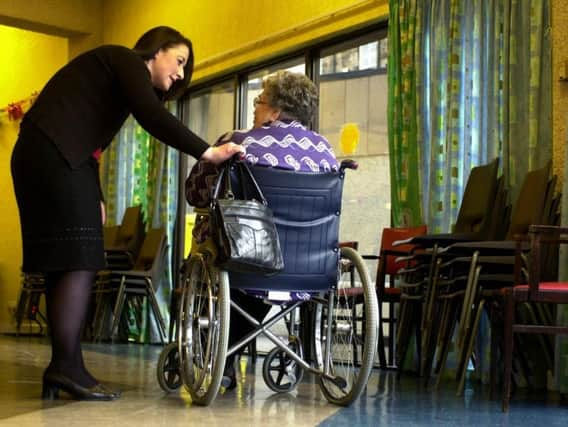Warning as cuts hit care home places


As many as one in five places in homes have been axed in some parts of the region as staffing and financial pressures take their toll.
The crisis has prompted new calls for action to tackle worsening access to care as the population ages, with 20 per cent of Yorkshire people predicted to be 65 and over by 2024.
Advertisement
Hide AdAdvertisement
Hide AdOfficial figures show 1,400 nursing home beds were lost in Yorkshire in the two years to March – a six per cent fall, nearly four times faster than across England as a whole.
The biggest reduction was in Hull where bed numbers fell by 20 per cent to 600, followed by cuts of 17 per cent in Barnsley and in Bradford and Craven.
Significant differences in standards have also emerged, with 10 per cent of nursing homes in Doncaster rated inadequate or needing improvement in July, rising to 70 per cent in neighbouring Wakefield.
Growing concern over provision has already prompted the Care Quality Commission to warn the future of care is “precarious”, while a second regulator last month said the existing system was not sustainable without extra public funding.
Advertisement
Hide AdAdvertisement
Hide AdMinisters have announced they will publish plans for a long-delayed social care strategy next summer but have controversially abandoned a pledge by former Prime Minister David Cameron to cap the cost of care to individuals at £72,500 from 2020.
Mike Padgham, chairman of the Independent Care Group, representing providers in North Yorkshire and York, said the sector was facing a “perfect storm” of rising demand, falling funding, tougher inspections and staff shortages – leaving homes “on the edge”.
“We fear for the future because no-one seems to have taken responsibility,” he said. “In some parts of Yorkshire, you won’t be able to buy publicly-funded nursing care because there are not enough beds – you’ll have to travel miles to get the care you want.”
He said it was up to Government to show a lead but social care had not even been mentioned in last month’s Budget despite its “critical link” to the NHS in reducing pressure on hospitals.
Advertisement
Hide AdAdvertisement
Hide AdRay Mitchell, of the national older people’s charity Independent Age, said the fall in bed numbers in Yorkshire was “very worrying” against a background of increasing demand.
“Choosing a care home can be a difficult and stressful decision, and families may be facing an unenviable lack of choice between care homes that provide good services and those that are assessed as inadequate or requiring improvement,” he said.
Richard Webb, director of health and adult services at North Yorkshire County Council and secretary at the Association of Directors of Adult Social Services, said: “Both locally and nationally, we have got real concerns about the future of nursing home provision.”
There were major problems in recruitment of nurses in the sector, numbers of trainee nurses had fallen after student bursaries were axed and Brexit was also causing uncertainty for EU workers.
Advertisement
Hide AdAdvertisement
Hide Ad“The system needs some fairly fundamental changes. We need to value the role nurses play in nursing homes as well as in the NHS,” he said.
In a statement, Hull Council said it was working to “attract, recruit and retain qualified nurses to work in the care home sector”.
The undersupply of nursing home beds was a national issue and it had recently approved a new purchasing system to “begin shaping the market to increase provision and quality of nursing care”. In Bradford, council and NHS officials are drawing up options to secure the resilience of the local care home market, which has a higher proportion of small providers and faces problems accessing good-quality care in nursing homes.
Coun Val Slater, portfolio holder for health and wellbeing, said: “Bradford’s position reflects the national issues within the sector and the market is fragile and sensitive to changes, especially during winter when pressure is applied to help support hospital discharges.”